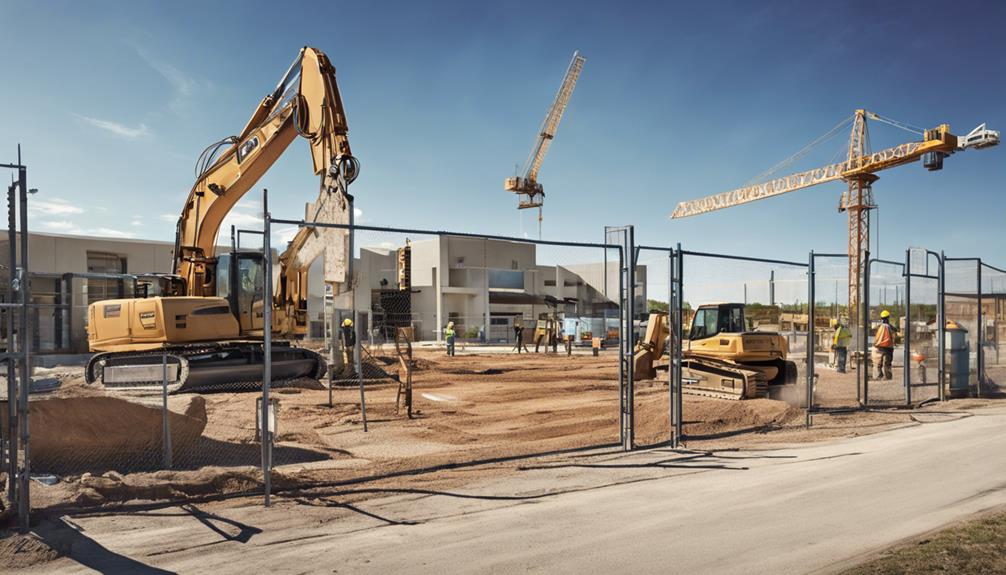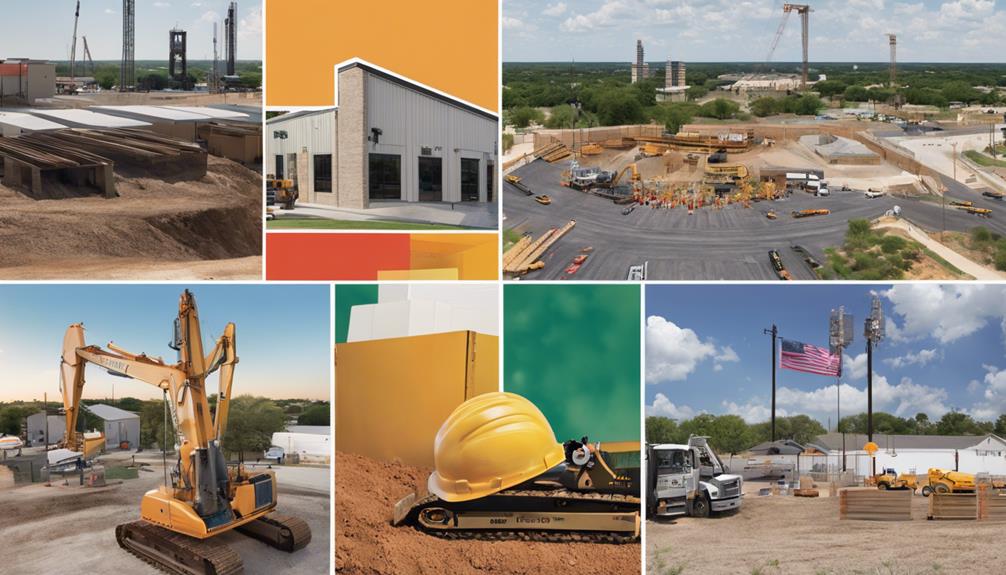When you're navigating the construction landscape in Round Rock, TX, understanding the significance of a permit bond is essential. This financial assurance not only safeguards homeowners but also establishes your credibility as a contractor. You might be wondering what specific requirements you need to meet or how to avoid common pitfalls. As you consider your next steps, it's important to explore how these bonds can impact your projects significantly and what mistakes could cost you time and money. Curious about how to secure one effectively?
What Is a Permit Bond?

A permit bond is your assurance that a contractor will comply with local laws and regulations while completing a project. This type of bond serves as a financial guarantee, ensuring that the contractor will fulfill their legal obligations associated with the work they're doing.
For instance, in Round Rock, TX, contractors may be required to obtain a permit bond to ensure adherence to local building codes and regulations like those found in Texas Surety Bonds. If they fail to adhere to these laws, the bond can be used to cover any resulting fines or damages.
When a contractor obtains a permit bond, they're essentially promising to follow the rules set by the local government. This includes securing all necessary permits and adhering to building codes.
If issues arise due to non-compliance, you may have a way to recover losses through the bond.
Permit bonds are typically required for various types of construction or remodeling projects. They protect you as a property owner, ensuring that you're not left to deal with any legal mess resulting from a contractor's negligence.
When hiring a contractor, it's crucial to ask about their permit bond status. Knowing they've one can give you peace of mind, allowing you to focus on the project rather than worrying about potential legal pitfalls.
Importance of Permit Bonds
Understanding the importance of permit bonds can significantly impact your construction project's success. These bonds serve as a safeguard for both you and the local government, ensuring compliance with laws and regulations.
When you obtain a permit bond, you're essentially guaranteeing that your project will adhere to the required standards, which helps maintain safety and quality in construction. Additionally, these bonds are designed to hold businesses accountable for adhering to licensing laws, further reinforcing their significance in the industry license and permit bonds.
Moreover, permit bonds protect property owners and the community from potential financial loss. If you fail to comply with local regulations, the bond provides a financial remedy, which can cover damages or fines. This not only reinforces your commitment to responsible construction practices but also enhances your reputation as a reliable contractor.
Additionally, having a permit bond can streamline the permitting process. Local authorities may view your project more favorably, knowing you're financially backed and dedicated to fulfilling your obligations. This can lead to quicker approvals and fewer delays.
Types of Permit Bonds

When navigating the landscape of construction, knowing the various types of permit bonds available can help you make informed decisions for your project. Permit bonds generally fall into a few categories, each serving distinct purposes.
First, you've got performance bonds. These ensure that contractors fulfill their contractual obligations, completing the project as specified. If they don't, the bond will cover the costs to hire another contractor to finish the job, providing peace of mind for the project owner and safeguarding the investment. Additionally, these performance bonds are legally binding agreements that protect against contractor defaults.
Next, there are payment bonds, which guarantee that subcontractors and suppliers get paid for their work on the project. This protects you from potential liens and financial claims.
You'll also encounter license bonds, which are required for certain trades. They ensure that contractors adhere to local regulations and standards, protecting the public from unlicensed or unethical practices.
Finally, there are utility bonds, often required for projects involving public utility work. They ensure that you'll restore any affected public property to its original condition after completing your project.
Understanding these types of permit bonds can help you choose the right one for your needs, ensuring a smoother and more compliant construction process.
Permit Bond Requirements in Round Rock
In Round Rock, you'll need to meet specific permit bond requirements to ensure your construction project runs smoothly and legally.
First, you must identify the type of bond required for your project, as this can vary based on the nature of the work you're undertaking. Common types include performance bonds and payment bonds, each serving a distinct purpose.
Next, you'll need to determine the bond amount, which is typically a percentage of the project cost. This amount is set by the city and can vary, so be sure to check the latest guidelines.
You'll also need to provide information about your business, including your license number and any relevant experience in the construction industry.
Additionally, it's crucial to work with a licensed surety provider. They'll help you navigate the application process and ensure you meet all necessary criteria.
Lastly, keep in mind that your bond must remain active throughout the project's duration. Failing to comply with these permit bond requirements can lead to delays or even penalties, so it's essential to stay informed and prepared as you move forward with your project.
How to Apply for a Permit Bond

Applying for a permit bond in Round Rock involves several straightforward steps.
First, you'll need to gather the necessary documentation, including your business license, proof of identity, and any specific project details related to the permit. This information helps the surety company assess your application.
Next, you'll want to find a reputable surety bond provider. Research various companies and read reviews to ensure you choose one that meets your needs.
Once you've selected a provider, reach out to them to start the application process. They'll guide you through filling out the application form and provide any additional instructions.
After submitting your application, you might need to provide further details or clarification. The surety company will evaluate your application based on your credit history and business experience.
Once approved, you'll receive a bond quote. Review the terms carefully before you accept.
Costs Associated With Permit Bonds
Understanding the costs associated with permit bonds is crucial for budgeting your project effectively. When you decide to obtain a permit bond, you'll encounter several expenses that can impact your overall budget.
First, there's the bond premium, which typically ranges from 1% to 15% of the bond amount. This percentage depends on factors like your credit score and the type of project you're undertaking.
You'll also want to consider any application fees that the surety company may charge. These fees can vary, so it's wise to shop around and compare quotes from different providers.
Another potential cost is the renewal fee, especially if your project takes longer than expected or requires extended bonding.
Keep in mind that some projects might necessitate additional documentation or inspections, which could lead to further fees. It's essential to factor in these potential costs while planning your project.
Common Mistakes to Avoid

When securing a permit bond, many people make mistakes that can lead to delays and added costs. One common error is underestimating the bond amount required. Always double-check the specific requirements for your project because a lower bond mightn't be accepted, forcing you to reapply.
Another mistake is failing to read the fine print. You might overlook essential terms and conditions, which could result in unexpected liabilities down the line. Don't rush through the documents; take your time to understand them fully.
Additionally, some individuals think they can shop for the lowest price without considering the provider's reputation. Choosing a bond issuer solely based on cost can lead to poor service or even bond cancellation.
It's also crucial not to ignore the timeline. Waiting until the last minute to secure your bond can cause project delays. Always plan ahead and allow ample time for processing.
Lastly, ensure you provide accurate and complete information on your application. Any discrepancies could lead to rejection or additional scrutiny, wasting your time and money.
Avoid these pitfalls to secure your permit bond smoothly and efficiently.
Tips for Securing a Permit Bond
Securing a permit bond can be straightforward if you follow a few essential tips. First, familiarize yourself with the specific requirements for your project in Round Rock. Different permits may demand different bond amounts or types, so knowing what you need is crucial.
Next, ensure your credit score is in good shape. A higher credit score often leads to lower bond premiums, so consider addressing any outstanding issues before applying.
It's also wise to gather all necessary documentation ahead of time. This might include your business license, financial statements, and project details.
When you're ready to apply, seek multiple quotes from different bond providers. Comparing rates and terms can save you money and help you find the best deal for your needs.
Don't hesitate to ask questions; understanding the terms and conditions of the bond is essential.
Lastly, maintain open communication with your surety provider throughout the process. They can offer guidance and answer any concerns you might have.
Working With Surety Companies

Working with surety companies can often feel daunting, but it doesn't have to be. The key is to approach the process with a clear understanding of what you need. Start by gathering all necessary documentation, such as your business information, financial statements, and project details. This preparation not only streamlines the application process but also shows the surety company that you're serious and organized.
Next, take the time to research different surety companies. Look for those with experience in your specific industry and a solid reputation. Don't hesitate to ask for recommendations from peers or industry associations.
Once you've narrowed down your options, reach out to several companies to compare terms, rates, and services.
When you communicate with surety agents, be honest about your project and any potential risks. This transparency fosters a better relationship and can lead to more favorable terms.
Finally, read the fine print of any agreement before signing. Understanding the terms will help you avoid unexpected issues later on.
Impact of Permit Bonds on Projects
Permit bonds play a crucial role in the success of construction and development projects. When you secure a permit bond, you're essentially guaranteeing that your project will comply with local laws and regulations. This commitment not only protects the integrity of your work but also enhances your credibility in the eyes of stakeholders.
By obtaining a permit bond, you minimize the risk of delays and costly penalties. If you fail to meet the project requirements, the bond provides financial assurance for the completion of necessary repairs or compliance measures. This means you can focus on executing your project efficiently without worrying about potential legal issues.
Additionally, permit bonds can improve your relationships with contractors and suppliers. They signal that you're a serious and responsible developer, making others more likely to collaborate with you. This can lead to better pricing and more favorable terms, ultimately benefiting your bottom line.
Conclusion
In Round Rock, TX, understanding permit bonds is essential for your construction projects. These bonds not only protect property owners but also boost your credibility as a contractor. By following the requirements and avoiding common pitfalls, you can secure a bond that helps streamline your permitting process. Remember, working closely with surety companies can make a significant difference. Embracing permit bonds ensures your projects run smoothly and meet local regulations, keeping you on the path to success.


